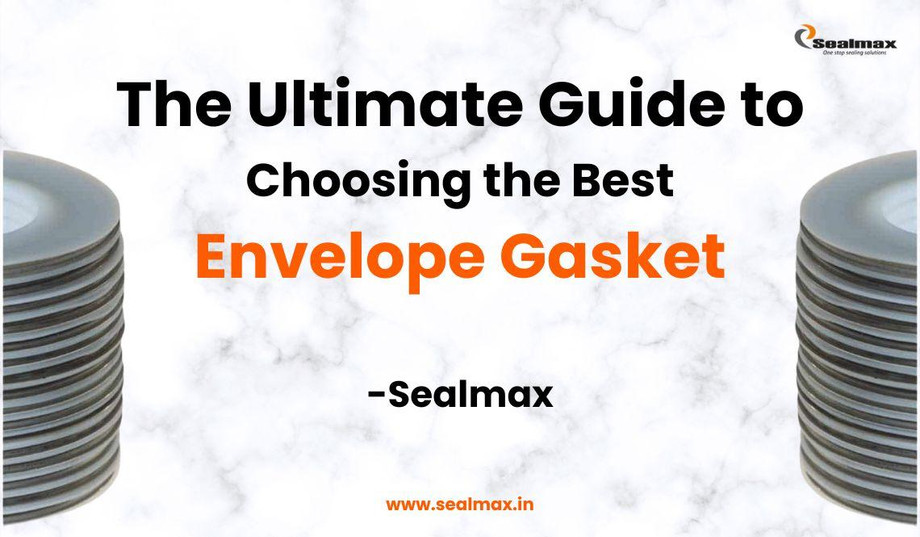
In the world of industrial processes, ensuring a leak-proof seal is paramount. Flanges, the bolted connections between pipes and equipment, often rely on gaskets to achieve this critical task. Among the various gasket types, envelope gaskets, also known as jacketed gaskets, have emerged as a reliable and versatile solution. But with an array of options available, selecting the best envelope gasket for your specific application can be a challenge.
This comprehensive guide empowers you to make informed decisions when choosing envelope gaskets. We'll delve into their key features, explore different materials and inlay options, and guide you through crucial selection factors.
Demystifying Envelope Gaskets: Design and Function
An envelope gasket comprises an envelope – a formed outer layer – typically constructed from a flexible and chemically resistant material like PTFE (polytetrafluoroethylene), also known as Teflon™. This envelope encases an inlay, a core element that provides structural strength and specific performance characteristics. The inlay material can vary depending on the application's pressure, temperature, and media compatibility requirements.
The envelope's design allows for a compression seal, where tightening the flange bolts compresses the gasket, creating a tight seal between the flanges. This compression also forces the inlay material to fill any minor imperfections on the flange surfaces, further enhancing leak prevention.
Advantages of Envelope Gaskets: Why They Stand Out
Envelope gaskets offer several advantages over traditional gasket materials like solid metal or spiral wound gaskets:
Superior Chemical Resistance: The PTFE envelope provides excellent resistance to a wide range of chemicals, making them ideal for applications involving harsh or corrosive media.
Enhanced Sealing Performance: The combination of a flexible envelope and a compressible inlay ensures a tighter seal, even under fluctuating pressure and temperature conditions.
Broad Temperature Range: PTFE's inherent heat resistance allows envelope gaskets to function effectively in extreme temperatures, both hot and cold.
Reduced Emissions and Leak Rates: The superior sealing properties minimize fugitive emissions, contributing to a cleaner and safer work environment.
Ease of Installation: The flexible design simplifies installation, reducing downtime during maintenance procedures.
Versatility: With various inlay options, envelope gaskets can be tailored to a wide range of applications.
Choosing the Right Envelope Gasket: Key Factors to Consider
Selecting the optimal envelope gasket requires careful consideration of several factors:
Application Requirements:
- Pressure and Temperature: Ensure the chosen envelope gasket can withstand the expected pressure and temperature ranges of your application. Inlay materials like carbon steel or graphite offer high-pressure capabilities, while expanded PTFE inlays excel in high-temperature environments.
- Media Compatibility: The gasket material must be compatible with the fluids or gases it will come into contact with. Consider chemical resistance charts and consult the manufacturer's recommendations for specific media compatibility.
Flange Type and Size:
Envelope gaskets come in various sizes and configurations to match different flange types and dimensions. Ensure proper fit for optimal sealing performance.
Inlay Material Selection:
The inlay material plays a crucial role in the gasket's performance. Common inlay options include:
- Carbon Steel: Provides excellent strength and high-pressure resistance for demanding applications.
- Graphite: Offers a good balance of pressure resistance, chemical resistance, and heat dissipation.
- Expanded PTFE: Ideal for high-temperature applications due to its excellent heat resistance and self-lubricating properties.
- Non-metallic Inlays: Available in various materials like aramid fibers or mineral fillers for specific chemical compatibility needs.
Budget: Envelope gaskets generally fall within a moderate price range compared to some other gasket types. However, the cost can vary depending on the size, material selection, and required pressure rating.
Pro Tip: Always consult the gasket manufacturer's technical specifications and recommendations to ensure the chosen envelope gasket aligns perfectly with your application's demands.
Conclusion: Choosing the Envelope Gasket Champion for Your Needs
By understanding the key features, benefits, and selection factors of envelope gaskets, you are well-equipped to make informed decisions for your specific sealing requirements. Remember, consulting with a reputable envelope gasket manufacturer is always advisable. Their expertise can guide you through the selection process, ensuring you choose the best envelope gasket that delivers optimal performance and longevity in your application. Are you looking for envelope gaskets suitable for your needs? We are just one step away. We, at Sealmax, produce high-quality and reliable envelope gaskets. Contact our experts now at +91 8983059377 or visit our website http://www.sealmax.in
